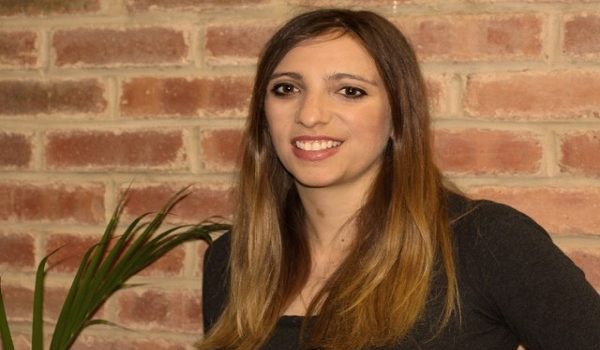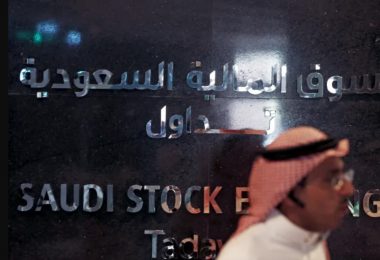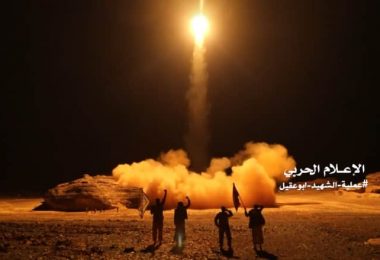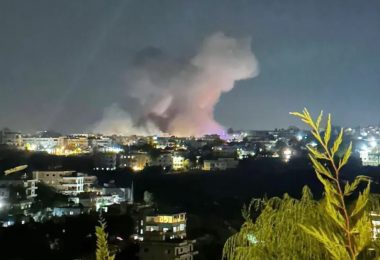a Political reporter in Guardian
Theresa May has said she hopes to send a message about women in leadership when she visits Saudi Arabia, but stopped short of overtly criticising the country’s approach to equal rights.
Speaking ahead of Tuesday’s second leg of her Gulf tour to boost post-Brexit trade ties in the region, the prime minister said she believed she would set an example as a female leader of a powerful government in a country where women are still barred from driving and must obtain permission from a male guardian to travel, marry or in some cases access healthcare.
“I hope that people see me as a woman leader, [and] will see what women can achieve and how women can be in significant positions,” May told reporters onboard her plane to Amman in Jordan on Monday. “I’ve talked to the Saudis on a number of occasions now and I raise issues of this sort. I think we have already seen some changes.”
May said she backed the Saudi government’s Vision 2030 programme of reform, though critics have said commitments to women’s rights in the strategy are vague pledges to increase numbers in the workforce by a small percentage.
On her visit, May is set to meet Princess Reema, the first Saudi woman to hold a government position – vice-president of women’s affairs at the country’s sporting authority.
May said she would be “talking to her about the role that she plays, and generally we do encourage people to look at a woman’s role in society”.
However, May hinted that she felt her role was not to make an overt statement as a female leader, which might jeopardise what she could achieve as a prime minister. “It’s important for me as a woman leader and as leader of the government of the United Kingdom to maintain the relationships that are important to us as a country, for our security, and our trade for the future,” she said.
The prime minister has so far avoided making any bold pronouncements about women’s rights on her visits to the region. Despite being the first woman to address the Gulf Cooperation Council of the six regional leaders in Bahrain last December, she made no direct mention of women’s issues at that meeting.
It remains to be seen how May will interpret the Saudis’ conservative dress code for women. Both the German chancellor, Angela Merkel, and former first lady Michelle Obama have eschewed headscarves on their recent tours of the country, but the Duchess of Cornwall wore a loose scarf on her last visit.
During the prime minister’s trip to Jordan on Monday, Downing Street announced a £1bn aid package to boost jobs development and education for Syrian refugees – an allocation of £840m worth of pledges made last year at the London Syria Conference along with £160m of new money.
In bilateral meetings with Jordan’s prime minister, Hani al-Mulki, and King Abdullah, who toured military facilities with the British prime minister on Monday, May has also agreed new UK support for the Royal Jordanian air force’s offensive against Islamic State.
The king and May exchanged gifts, with the prime minister giving the monarch a framed copy of the original recommendation for the Military Cross that his British grandfather, Walter Percy Gardiner, received in 1944 when he served in the
Royal Engineers regiment.
Though counter-terrorism and the refugee crisis have been at the forefront of the formal announcements, the visit to Jordan and Saudi Arabia marks May’s first diplomatic offensive since the triggering of article 50 to formally explore future trade ties.
No 10 said the prime minister was “expected to explore ways of boosting our already very strong ties” with Saudi Arabia, though human rights groups have warned that any new cooperation should not come at the cost of ignoring the country’s chequered human rights record, including juvenile executions and its brutal offensive in Yemen.
Commenting on May’s visit, the Labour party leader, Jeremy Corbyn, said: “The prime minister should put human rights and international law at the centre of her talks with Saudi Arabia’s government this week.
“Numerous human rights organisations, including the UNHRC and Amnesty International, have documented the dictatorial Saudi monarchy’s shocking human rights record.
“The Saudi-led coalition bombing in Yemen, backed by the British government, has left thousands dead, 21 million people in need of humanitarian assistance and 3 million refugees uprooted from their homes.
“Unless the prime minister challenges the Saudi regime over its abuses this week, it will be clear she is ready to sacrifice human rights and security on the altar of the arms trade.”
On Sunday, it was revealed the Met police’s war crimes unit had begun a “scoping exercise” assessing whether criminal prosecutions could be brought over Saudi Arabia’s bombardment of the country, which is estimated to have killed more than 10,000 civilians and displaced more than 3 million people. Amnesty International’s Allan Hogarth said ministers had “buried their heads in the sand” over the conflict.
The funding for jobs and education for Syrian refugees, intended to incentivise them to remain in the region, comes under a cloud of criticism that Britain has closed many of the avenues for refugees to come to the UK.
The support will include basic humanitarian aid, funding for education and vocational training for Syrian children in Jordan and Lebanon, as well as infrastructure projects with the aim of increasing local employment opportunities for Syrians.
May said the UK had “led the international response to the defining humanitarian crisis of our generation, and will continue to set the pace”.
The government has been keen to stress its commitment to funding regional aid for refugees to deflect fierce criticism of the closure of programmes like the Dubs scheme, which brought lone child refugees to the UK from camps in Europe, though far fewer than expected have arrived. May said the funding would “provide a meaningful alternative to risking their lives trying to reach Europe … This is clearly in the UK’s national interest.”
Separately, the chancellor, Philip Hammond, is to visit Delhi and Mumbai at the head of a major trade delegation to try to drum up post-Brexit commercial opportunities.
Joined by the junior international trade minister, Mark Garnier, the Bank of England governor, Mark Carney, and a series of business executives, Hammond will take part in a trade summit hosted by his Indian counterpart, Arun Jaitley, saying it is “more important than ever” for the UK to strengthen its ties with India after leaving the EU.







